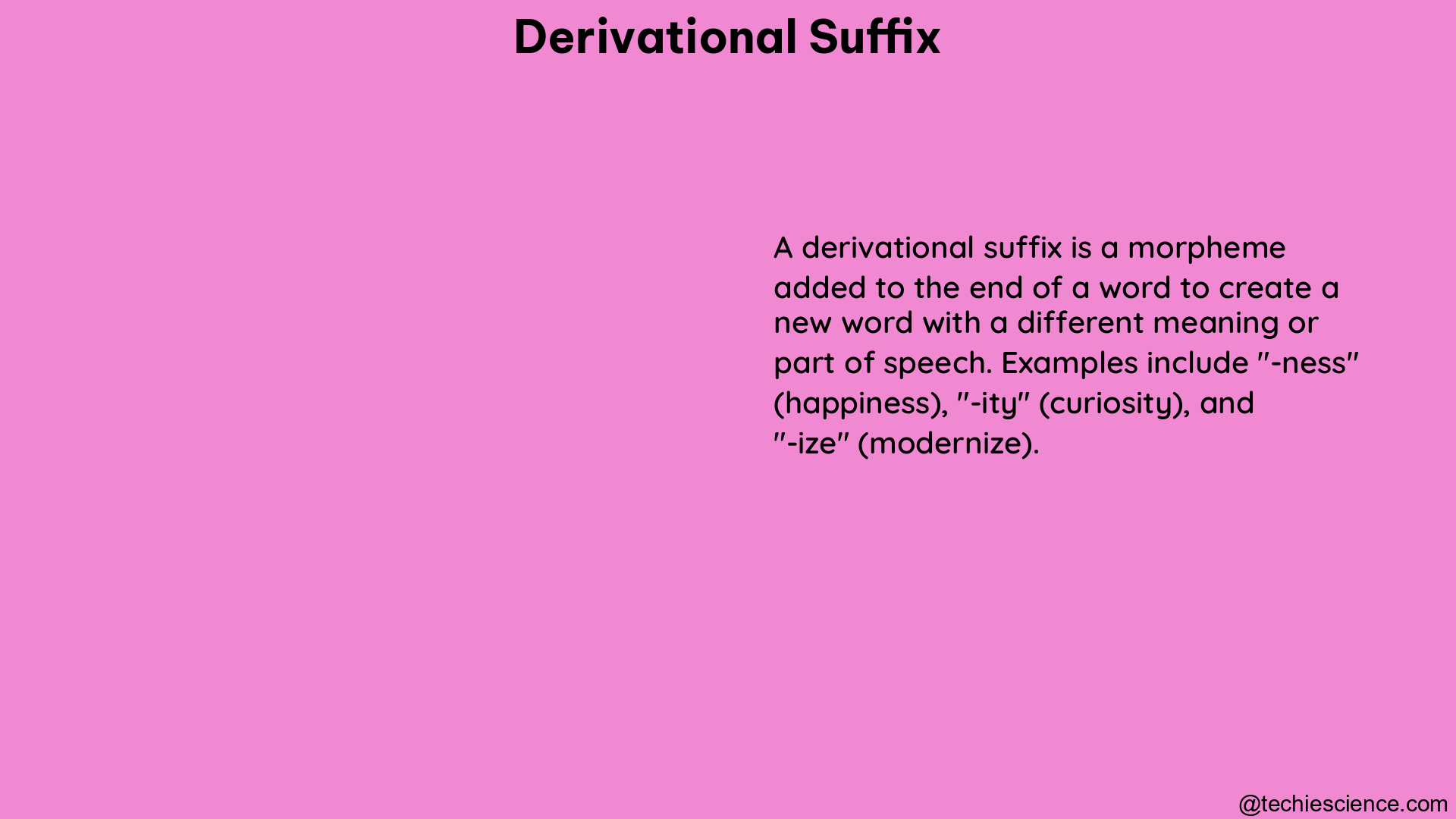Derivational suffixes are a fundamental aspect of the English language, playing a crucial role in the formation of new words. These suffixes, when added to root words, can significantly alter the part of speech, meaning, and grammatical function of the original word. This comprehensive guide delves deep into the intricacies of derivational suffixes, providing a wealth of information for English language learners and enthusiasts.
Types of Derivational Suffixes
Forming Nouns
Derivational suffixes can be used to create new nouns from various parts of speech. Here are some common noun-forming suffixes and their functions:
- -er: Denotes a person or thing that performs an action (e.g., teacher, writer, computer).
- -ment: Indicates a condition or state of being (e.g., argument, enjoyment, development).
- -ation: Expresses a state of being or an action (e.g., admiration, creation, education).
- -ity: Denotes a quality or state of being (e.g., curiosity, generosity, simplicity).
- -ness: Indicates a state or condition (e.g., kindness, happiness, darkness).
- -ist: Refers to a person who practices or promotes a particular belief or activity (e.g., artist, scientist, communist).
- -ism: Represents a doctrine, system, or theory (e.g., feminism, capitalism, socialism).
Forming Adjectives
Derivational suffixes can also be used to create new adjectives from various parts of speech. Here are some common adjective-forming suffixes and their functions:
- -able: Adds a sense of possibility or capability (e.g., doable, readable, manageable).
- -ed: Indicates a state of completion or possession (e.g., tired, skilled, educated).
- -ing: Expresses a sense of continuation or ongoing action (e.g., shining, interesting, captivating).
- -ious: Denotes a characteristic or quality (e.g., curious, ambitious, rebellious).
- -ive: Indicates a characteristic or tendency (e.g., creative, active, decisive).
- -y: Expresses a quality or state (e.g., dirty, fluffy, slimy).
- -ic: Pertains to or relates to a specific field or subject (e.g., atomic, historic, economic).
- -al: Indicates a relation or connection to a specific thing or concept (e.g., instrumental, cultural, personal).
- -ical: Combines the meanings of -ic and -al (e.g., biological, mathematical, historical).
- -ful: Denotes the possession of a particular quality or characteristic (e.g., careful, helpful, beautiful).
- -less: Indicates the lack of a particular quality or characteristic (e.g., careless, hopeless, lifeless).
Forming Verbs
Derivational suffixes can also be used to create new verbs from other parts of speech. Here are some common verb-forming suffixes and their functions:
- -ize: Indicates a process of becoming or making something (e.g., standardize, modernize, personalize).
- -ify: Denotes a process of making something (e.g., purify, solidify, simplify).
Examples and Rules

Derivational suffixes follow specific patterns and can be applied to different parts of speech to create new words. Here are some examples and rules:
- -ly: Changes an adjective to an adverb (e.g., slow → slowly, quick → quickly, careful → carefully).
- -ness: Forms a noun from an adjective (e.g., slow → slowness, kind → kindness, happy → happiness).
- -en: Forms a verb from an adjective (e.g., weak → weaken, soft → soften, bright → brighten).
- -ance: Forms a noun from a verb (e.g., deliver → deliverance, perform → performance, appear → appearance).
- -ful: Forms an adjective from a noun (e.g., care → careful, hope → hopeful, power → powerful).
Key Points
- Derivational suffixes create new words by changing the part of speech or meaning of the root word.
- They follow specific patterns and can be applied to different parts of speech.
- The last derivational suffix determines the part of speech of the new word.
- Understanding the functions and meanings of derivational suffixes is crucial for expanding one’s vocabulary and improving language proficiency.
- Mastering the use of derivational suffixes can enhance writing, reading comprehension, and overall communication skills.
Advanced Derivational Suffix Patterns
Beyond the common examples mentioned earlier, there are more advanced derivational suffix patterns that can be explored:
Forming Adverbs from Adjectives
- -ly: This suffix is the most common way to form adverbs from adjectives (e.g., quick → quickly, slow → slowly, careful → carefully).
- -wise: This suffix can also be used to form adverbs, often with a sense of “in the manner of” or “with respect to” (e.g., clockwise, lengthwise, otherwise).
Forming Nouns from Verbs
- -age: Indicates a process or result of an action (e.g., manage → management, translate → translation, migrate → migration).
- -al: Denotes an act or process (e.g., arrive → arrival, revise → revision, decide → decision).
- -ance: Expresses a state or condition (e.g., perform → performance, appear → appearance, resist → resistance).
- -cy: Indicates a state, condition, or quality (e.g., profess → proficiency, consult → consultancy, confidant → confidentiality).
Forming Adjectives from Nouns
- -al: Indicates a relation or connection to a specific thing or concept (e.g., nation → national, tradition → traditional, profession → professional).
- -ary: Denotes a relation or connection to a specific thing or concept (e.g., revolution → revolutionary, legend → legendary, dictionary → dictionary).
- -ic: Expresses a relation or connection to a specific field or subject (e.g., economy → economic, history → historic, biology → biological).
Forming Verbs from Nouns or Adjectives
- -ize: Indicates a process of becoming or making something (e.g., modern → modernize, critic → criticize, symbol → symbolize).
- -ify: Denotes a process of making something (e.g., pure → purify, simple → simplify, solid → solidify).
By exploring these advanced derivational suffix patterns, you can further expand your understanding of word formation and enhance your ability to comprehend and use a wider range of vocabulary.
References
- McDaniel College Writing Center – Parts of Speech & Suffixes
- Wikipedia – Morphological Derivation
- Lexical Tools – Derivational Suffix List
- Lexical Tools – Suffix Derivations
- Sight Words – Meanings of Common Derivational Suffixes

Hi, I am Srishti Mukherjee. I have completed my M.A. in English.
I always like to explore new zones in the field of English Literature
Apart from this, I like to read Novels and watch movies.